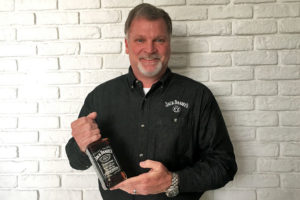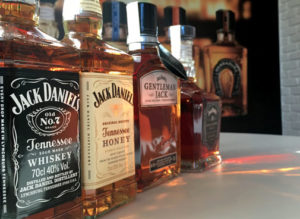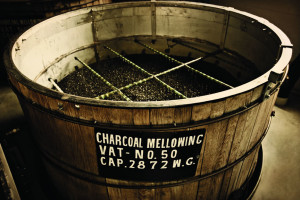By Emma Briones
He may spend a lot of time traveling around the world promoting new Jack Daniel’s expressions, but Master Distiller Jeff Arnett does not look over his shoulder and worry about how things are going back in the distillery in Lynchburg, Tennessee. That is because he is confident that everyone back there is working hard to make the best Jack Daniel’s that they know how, and he has that confidence because he has been a “Jack man” for more than 16 years.
Arnett went from being an engineer spending his free time as a Tennessee Squire to coming to work at the distillery in 2001, and then becoming the seventh Master Distiller of Jack Daniel’s, a dream come true. Arnett is devoted to the brand and the whiskey, and with his piercing blue eyes he carefully looks after every drop.
Tennessee is 4,600 miles from Spain, so it’s not often that Lynchburg’s Master Distiller comes calling, and it was a treat to be able to have a talk with him.
EB: So you’ve been in love with Jack Daniel’s for a while…
JA: I was Tennessee Squire, so I was in the word of mouth thank club that has existed for Jack Daniel’s since the 1950s. When in 1955, Frank Sinatra held a bottle of Jack Daniel’s on stage and called us ‘the nectar of the Gods’, our sales doubled. For the next 25 years, we were not able to make enough Jack Daniel’s.
EB: And what did you do as a Tennessee Squire?
JA: When people would go to stores and there would be no Jack Daniel’s on the shelves, they would take down names and address. We started writing letters to them to say “hey we’re sorry, we are asking for your patience.” It was a letter writing campaign where we started directly communicating with consumers and fans of Jack Daniel’s. Even though we are not on allocation today, the program still exists.
EB: Is that what brought you to Jack Daniel’s?
JA: If you find somebody who is a Tennessee Squire—men, women, young, old—and ask them: “if you were to leave your job, what would you want to do?” Most of them would tell you that they would want to move to Lynchburg and work at Jack Daniel’s. So, when I was able to do that, that was a dream for me. My worst day at Jack Daniel’s it is still a pretty good day. I mean, what else can you ask for?
EB: You started 17 years ago as a Quality Control Manager.
JA: I just felt very fortunate to be able to work at Jack Daniels somewhere. I learned everything that had to go right, the things that could go wrong, what we were gonna test and check… I got immersed in what it takes to make a product consistently, which I think is one of the true strengths of Jack Daniel’s.
EB: And now you are Master Distiller. Is there a secret for that?
JA: You will never read a book that turns you into an expert whiskey maker. I was fortunate because I’ve been surrounded by people who have been making whiskey for a long time. They learned how to do it from their parents and grandparents – I have always had a strong supporting team. When I was a quality control manager, I truly felt like everyone there felt that quality was their responsibility too, it wasn’t just on me. And likewise, today, as a distiller, I don’t feel like any drop is solely on my shoulders, they take great pride in the whiskey that they make.
EB: When you started on Jack Daniel’s, there were only three distilleries in Tennessee, Jack Daniel’s, George Dickel and Prichards. Now there are around 30…
JA: I didn’t know that the Tennessee distilling industry would blow up as fast and grow like it did. When they changed the laws, any county that had previously voted in liquor by the drink now became eligible to also distill, that opened up like 75 counties.
EB: Looks like there is some competition.
JA: I am the vice-president of the Tennessee Distillers Guild and I consider us to be a gentleman’s industry. We try to work together, to be responsible. If somebody in our industry starts to do bad things it casts a poor light on all of us, so we are helping one another. If they are struggling, having a problem with some part of the process, we offer help. We don’t sell barrels to the industry, but we have helped a few of the smaller distillers in the state of Tennessee of getting new barrels as far as they are using the Lincoln County Process.
EB: Is it important to you that they use the Lincoln County Process?
JA: If they don’t want to use the Lincoln County Process, then they don’t call it Tennessee Whiskey, just the same way not every famous [whiskey] made in Kentucky can call itself a bourbon.
EB: What does it take to call it a Tennessee Whiskey?
JA: There is sort of a historical process that has long followed those words. It gave Tennessee a reputation for great whiskey. Some have been able to embrace that, adopt it and actually starting to create their own versions of it. And it is great for the industry.
EB: When everybody is trying to make great products, it forces every distillery to do their best.
JA: We’ll soon be at a time when you look at it more like Scotch. There is not one single Scotch that is good, all kinds of Scotch Whisky is considered to be good whisky. We want the words Tennessee whiskey to be revered, that when you see that on the label, that you say hey that is something I’d like to try. We’ve all agreed to that as a group of distillers, and we’re kind of holding hands and doing our very best.
EB: That may bring some new Jack Daniel’s expressions.
JA: When I became the Master Distiller, we just had three products in the Jack Daniel’s family: Gentleman’s Jack, Single Barrel and Old Number 7. Since 2011, we have come with at least one new product every single year. We work on ten products in the offer If you look at the extensions of the single barrel, rabbit and of course our first rye.
EB: Looks like Rye is the hot category now.
JA: Rye is now the fastest growing form of American whiskey. Jack Daniel’s drinkers, they tend to be very loyal. But at the same time, there is a natural curiosity that you like to sample around and try different whiskeys. If a Jack Daniel’s fan starts to drink a Rye Whiskey and says ‘hey, I really like that’, it would be a shame if they couldn’t drink rye whiskey and stay with Jack Daniel’s.
EB: And now you’ve already created a Rye.
JA: We’re definitely not done, I think we can further explore grain bills, warehousing, maturation, and changes. Whether it be to make it in maple barrels or rubbing barrels whatever we choose to do, we have a lot of options on the table, and the only question is which one do we wanna do next. The way that whiskey category is today, as aggressive and as fast-moving as it is, it has actually given us, and me, much more attitude. People want to keep it going, want new products. So we are gonna give it to them.
 The Whiskey Reviewer A World of Whiskey, Poured Every Weekday
The Whiskey Reviewer A World of Whiskey, Poured Every Weekday




2 comments
Pingback: TWR: Interview mit Jeff Arnett, Jack Daniel's Master Distiller - WhiskyExperts
Pingback: Don’t put a cork in it: Whiskey makers keep living in the past – Neat Stuff